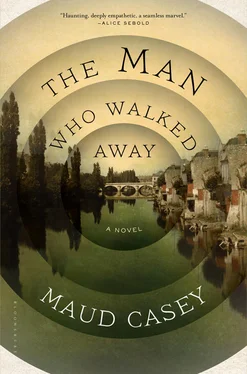“This is for you,” the Doctor said yesterday (which was Sunday, and now there is today, which is Monday), leaving the map of Albert’s journeys on the bedside table. “This is where you have been. I will leave it here for you to study. Perhaps you will remember something else.” His father once looked at Albert the way the Doctor looked at him then, his face a question. Albert wants now what he wanted then, to smooth the lines of that face the way he smooths the wrinkles out of the map that makes a shape out of his mysterious life, out of those places that returned miraculously to Albert from somewhere far off so that he could recite them, offering them up to the Doctor: Montauban, Moissac, Agen, La Réole, Castel-Sarrazin, Puyoô! Posen, Posen, Posen. . The shape is as beautiful as the large silvery fish that swam between his bare feet one day when he discovered himself, not knowing how he got there, sitting on a log fallen across the cold swirl of a river, his shoes somehow back on shore. He felt the pressure of it against his feet dangling in the bracing water, moving with such certainty, a glimmer and there it went: going, going, gone.
The places too swam through Albert’s mind, so clear and then they were going, going, gone. He runs his hand over the thick black pencil marks from here to there, from there to here, hoping that the movement of his hand will ignite movement in his mind. But it is as if it never was.
He is twenty. He is twenty. He is twenty.
“We will watch over you.” In the Doctor’s voice when he is with him, he hears the watching; he hears it enough to rest. “We won’t send you away,” the Doctor says, his watch ticking Albert back into time. The Doctor said they would talk more tomorrow (tomorrow, which is Tuesday). We’ll give you time to remember and then we will talk more again ? Tick, tick, tick, he will bring him back.
But there are so many questions Albert can’t answer. What if there isn’t enough time in the world for him to remember? How long have you been traveling? When was the last time you saw your family? Where have you been? Why do you go? Why can’t you stop? What causes you to stop when you do stop? Albert cannot smooth the lines on the Doctor’s face if he cannot answer the questions. Who are you, Albert? This is the question that swims beneath the other questions. Who are you?
Ring ( shadow ring ). It is time for dinner. In the park outside the Palace of Justice, the trees are on fire with the brilliant colors of the setting sun. Albert wishes they would light his mind on fire so he could see from here to there and there to here.
“You need to eat your beautiful dinner in order to continue to make your beautiful music,” Albert hears Claude say to Rachel, trying to entice her away from the piano as he does every night. “You can leave the coat on but roll up the sleeves,” Henri says to Samuel, who is lurking in a corner. “Look what a mess. .” It is time for dinner, but what if the fleeting illuminations continue to be fleeting, if the setting sun doesn’t light his mind on fire long enough for him to see his life? It is right in front of him, somewhere in the shadows of this map, if he could only see.
His finger moves over Mont-de-Marsan and there is the flicker he offered to the Doctor: discovering himself there and not knowing what else to do, he enlisted voluntarily in the 127th Infantry Regiment at Valenciennes, though there was a letter at home declaring him unfit for service by the review board.
What was the rest of the story? Something terrible happened. On the road in Mont-de-Marsan, marching with the other conscripts. And then, there he was, his friend Baptiste! Albert discovered himself and then he discovered Baptiste. Here is love , this shrunken man who was once a boy who smelled of apples and dirt. Together, they deserted the infantry and crossed the Belgian frontier, trading weapons and uniforms for laborers’ clothes and three francs each. Baptiste marched with him through Tournai, Ostend, Bruges, Ghent, Brussels. He was thinner than a rail. Unable to find work, they begged until they were run out of every town. Albert tries to catch the memory by the tail before it trails off into darkness. He touches Angoulême on the map and out of the darkness comes the grape harvest; he touches Aix, and there is a hayfield; he traces the Rhine, and there is the sound of the thin lightning-bolt crack that chased him across the surface to the other bank. As much as Albert yearns for the crack to split him open, to split him open and send him crashing into the water, it never happens.
“In Saint-Étienne, I remember lying in a hospital with a cold compress on my head, given quinine sulfate to cure a toothache,” Albert offered yesterday as it rose up into the light of his memory — the cold compress, the quinine, the toothache, and Saint-Étienne disappeared. Through Lyon he walked, past the funicular railroad, through Grenoble, on the promenades along the Isère River; through a town whose name he never learned, filled with the delicate fragrance of the rosewater manufactured there, walking until the earth’s tremor rumbled through his feet and up his shins, until his bones expanded, until his blood circulated astonishment, until, finally, there it was, the urge to walk, and he was lifted into oblivion.
“The leaves of the trees in the public garden were gold that time,” he said yesterday, but the memory escaped him before he was able to speak it. Now he looks at his home, Bordeaux, on the map, and remembers the leaves of the trees in the public garden sparkling gold through the green from the lights of the gas lamps his father had helped install and Albert, a boy, walking past them; the lights glittered and filled his eyes. The chestnuts rained down when he looked up at the tree’s spindly arms, and he imagined that if he settled on a sturdy branch he could see out over the slated rooftops of the city and the church steeples. From that perch, he could see the flickering lights of hundreds of gas lamps illuminate the city — the giant clock of St. Eloi, and the church of Saint-Paul, and Saint-Michel, and Sainte-Croix; the Pont de Pierre, the grand theater, the ancient gate to the city, the ancient amphitheater where the gladiators once fought. He might reach up like the arches and buttresses of the nearby cathedral, up and up and up all the way to the heavens, but then the memory went up and up all the way to the heavens. It too was gone, back into darkness.
“There is time,” the Doctor reassured him today. “You will remember. You are not to worry.” He smiled and nodded, but Albert is sure the Doctor smells it on him — the stench of not remembering. How could he not? It fills the room; it smells of wet, dead leaves, of dying and rot. It lingers even after the Doctor is gone; it fills Albert’s nostrils now. It has driven people away, causing them to leave him by the side of the road, as if he were contagious. To be a man is to be forged out of days, adding up to something with weight and heft; to be able to look back and say, I was here and then here and then there and then there and then here. He has heard people say, I’ve lost these days. They might be gone but the people do not mean they are lost entirely. It was the difference between growing older and oblivion. “There is time,” the Doctor has said, and Albert wants more than anything for this to be true, but he is not so sure.
When there is a knock at the door, Albert thinks it is the Doctor, come to say they will try again today after all. Or perhaps he is making sure that Albert is all right, that he is coming to dinner. Dinner cannot go on without him. But when he opens the door, it is the veteran with his fuck-you-too face.
Читать дальше












